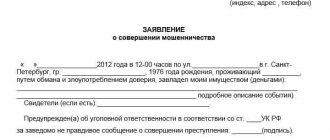Fraud is one of the most sophisticated methods of crime. The criminal plans not only to embezzle other people's money or things, but also figures out how to gain the trust of the intended victim through deception.
If a citizen finds himself in the network of a fraudster, he should immediately contact the police. As a rule, most scammers are confident that the victim will not contact law enforcement services and continue to implement their fraudulent schemes. To stop the activities of fraudsters, you must submit a statement to the police department.
Article for fraud
Article 159 for fraud of the Criminal Code of the Russian Federation provides for the following types of illegal actions:
- Deception for the purpose of obtaining financial or other type of benefit (consists in providing false information);
- Financial manipulations that led to the unlawful enrichment of the fraudster;
- Illegal actions with property, seizure of valuables (movable and immovable property);
- Applying for a loan, not returning funds;
- Refusal to fulfill assumed obligations (violation of the terms of the contract, receipts and other documentary evidence of illegal actions).
How to write a statement to the police about fraud, sample
A statement about fraud should be filed with the police if the victim noticed the fact of illegal actions against him and he suffered some material damage. It is also important to file a fraud claim even when the fraudster’s unlawful actions have not yet led to significant financial losses.
Free legal consultation We will answer your question in 5 minutes!
Ask a Question
A sample statement to the police regarding fraud should be submitted as quickly as possible after discovering facts of violation of the country's legislation. According to the law, such a statement of fraud has a free form.
Free legal consultation
We will answer your question in 5 minutes!
Ask a Question
When writing it, you just need to adhere to the following regulatory rules:
- At the top of the application (header), the institution where the application is being submitted (address of the police department, its number), and the name of the head of the department must be indicated.
- Below are personal details (from whom the police report regarding fraud is received), address of residence.
- The table of contents must correspond to the content - the standard heading is: “Statement of fraud.”
- Below is the story, the essence of the problem. The date and location where the incident occurred must be clearly indicated.
- Be sure to include all information regarding the scammer, his appearance, and other personal details, if available.
- Calculation of the amount of losses expressed in national currency (including material damage).
- Signature and date.
This is also important to know:
Inheritance by law: methods of accepting and opening an inheritance, documents for registration, state fees, how much do notary services cost?
Knowing where to write a fraud report, you can protect yourself in the event of such unpleasant situations. Please note that such a document is submitted not only to the police department at the victim’s place of residence, but also to any other. This is true for cases where an unpleasant incident happened not in the city of residence, but during a vacation, vacation or work trip. That is why everyone needs to know what fraud is and what article of the Criminal Code of the Russian Federation provides for liability for such a violation of the law.
Download: Sample police report about fraud
Areas of fraud involving or in relation to a legal entity
Examples of fraud involving a legal entity include the illegal receipt of funds by it in cases of charging a fee for imaginary employment, when making transactions with real estate that does not belong to the organization or without the power of attorney or instructions necessary in such cases, liquidation of the organization immediately after receiving a subsidy or funds in account for advances of future deliveries.
Fraud against legal entities may include receiving an advance payment without the actual intention of making a delivery, concluding an agreement that obviously cannot be executed without violating the law, or other cases of concealment by the other party of the true intentions when concluding an agreement for the purpose of unjust enrichment.
In January 2022, the Sverdlovsk Regional Court convicted the director of a driving school under Part 3 of Article 159 of the Criminal Code of the Russian Federation. The driving school undertook to provide the military unit with educational services to train military personnel to be drivers of categories D and E, knowing that the conclusions on the compliance of the educational and material base with the established requirements were cancelled. Despite this, documents confirming successful completion of training were issued, and payment under the government contract was received in full. In this case, one legal entity (driving school) is a participant in the crime, and the second (military unit) is the victim.
In the field of lending
Within the meaning of the law, the creditor in this case may be a bank or other credit organization that has the right to conclude a loan agreement. Cases of loans from other legal entities fall under Article 159 of the Criminal Code of the Russian Federation.
Fraud in the field of lending consists of providing false information to the lender in order to receive funds without knowingly intending to return them.
In December 2022, the Central District Court of Kemerovo found guilty under Part 1 of Article 159.1 of the Criminal Code of the Russian Federation a resident of Kemerovo, who took out a bank loan secured by an apartment in a building under construction. Subsequently, after receiving a certificate of ownership, she sold the apartment to a third party, misleading the latter about the absence of encumbrances, and stopped making payments under the loan agreement. When considering the case, the bank, along with the third party, was recognized as a victim.
Using electronic means
Electronic means of payment primarily mean credit and debit bank cards.
An act is classified as fraud if an authorized employee of the organization is provided with the details of a payment card belonging to another person to complete the transaction.
In November 2022, the Kirovsky District Court of Tomsk found a resident of Tomsk guilty under Part 2 of Article 159.3. Having received a credit bank card from an acquaintance to buy groceries, he went to a cell phone store and purchased a cell phone, deceiving the seller about the identity of the bank card.
In this case, a legal entity (trade organization) unwittingly served as a tool for the illegal enrichment of an individual.
Insurance crimes
In these cases, fraud is committed by deception regarding the occurrence of an insured event or the amount of insurance compensation to be paid.
In December 2022, the Ruzaevsky District Court (Republic of Mordovia) found two residents of the Ruzaevsky District guilty under Part 2 of Article 159.5 of the Criminal Code of the Russian Federation. Having entered into a criminal conspiracy, they illegally received funds from the insurance company by simulating a traffic accident involving a car and truck they owned. It has been reliably established that mechanical damage to the front part of the car body allegedly sustained during an accident existed even before the criminal purchased the vehicle.
In December 2022, the Kirovsky District Court of Astrakhan found the general director of the medical center guilty under Part 3 of Article 159.5. Based on forged documents on the provision of medical care to nonresidents, the medical center received insurance compensation from the territorial Compulsory Health Insurance Fund. In the first case considered, the crime was committed against a legal entity (insurance company), in the second - with its participation.
More information about insurance fraud can be found in a separate article.
Regarding computer information
A special category of cases is considered by Article 159.6 of the Criminal Code of the Russian Federation.
It is used when theft occurs by entering, deleting, blocking, modifying computer information or deliberately affecting servers, computers, laptops, tablets and smartphones equipped with software, or information and telecommunication networks.
In December 2022, the Elektrostal City Court (Moscow Region), under Part 3 of Article 159.6, recognized a group of persons who stole funds from the accounts of bank clients they deceived by penetrating the information system of a credit institution. By posting advertisements on the Internet about providing lending assistance to individuals and presenting themselves with fictitious names, they illegally collected personal data from victims, on the basis of which they could gain access to their bank accounts. In this case, the legal entity (bank) not only became an unwitting accomplice in the crime, but also a victim.
We talked in more detail about fraud in the field of computer information here.
We advise you to familiarize yourself with the various types and schemes of fraud, including the newest ones, so as not to fall for the tricks of scammers. Read about phone scams, business scams, abuse of position, and corporate and financial fraud.
Application deadlines
According to current legislation, law enforcement agencies must accept (or not accept) the submitted application within three calendar days from the date of its submission. It is during this period that it is established whether the application complies with the regulatory rules, and whether the facts presented contain elements of a crime. In some cases, this period may be extended to ten days if the application requires careful examination by law enforcement agencies.
The statute of limitations for fraud is the period of time during which a defendant may be subject to criminal penalties, including imprisonment or punitive damages. In accordance with the generally accepted rule, the statute of limitations in the Russian Federation is 3 years.
Important
After the statute of limitations has expired, the court may enter a conviction if the defendant does not state during the trial that the statute of limitations has expired. A similar norm is described in Article 199 of the Civil Code.
Find out what powers the local police officer has?
This is also important to know:
Withdrawing a resignation letter at your own request
Types and schemes of fraud
Now the interests of scammers are focused on several main areas. Here is a list of them (short!).
Fraud in the sale of apartments
Scammers are improving their schemes every day. Real estate is sold using fake passports, contracts are concluded with a person who does not have authority from the owner, dummies and unscrupulous notaries are involved.
Fraud in the real estate market is often difficult to prove. Therefore, the help of an experienced lawyer will come in handy.
Fraud using payment cards
Since non-cash payments are replacing cash payments at an increasing speed, it is not surprising that the number of those who want to receive undue benefits at the expense of bank card holders is growing.
And here, too, the attackers got their own space for imagination.
For example, special devices are inserted into ATMs that allow the PIN code to be read from a customer’s card. In addition, an unscrupulous seller or waiter can write off the same amount twice.
Money Fraud
Exchange currency for counterfeit money and vice versa. Helping a relative who is in a difficult situation. A banal debt under a loan agreement and receipt.
These are the common schemes that are now in the arsenal of scammers.
Internet fraud
Here, attackers have a huge scope for imagination. It’s even difficult to put the entire list of tricks into a separate article. Making payments using fictitious details, failure to deliver goods, receiving items of inadequate quality.
Loan application fraud
Often a person does not know that a loan is issued in his name. Trouble arises when calls from the bank or debt collectors begin to annoy you. In this case, legal assistance is vital.
mobile connection
Fraudsters have also mastered modern technologies.
For example, a user receives a message on his smartphone that he has won a big prize. However, there is one “but”. You need to debit a certain amount from your mobile account. Naturally, at the same time, money and winnings became an illusory dream.
We have described only a partial list of techniques used by modern hunters for other people’s money. Each area of their actions will be covered in our separate article.
Determination of limitation periods
The statute of limitations for fraud differs depending on the severity of the fraudulent crime committed. For minor offenses that were committed personally (not by a group of persons), the general statute of limitations is 2 years from the date of commission of the crime. If the fraud was committed by a group of persons, then this period increases to four calendar years. In cases where damage was caused on a particularly large scale (more than one million rubles), the statute of limitations is ten years.
Free legal consultation We will answer your question in 5 minutes!
Free legal consultation
We will answer your question in 5 minutes!
Ask a Question
Call: 8 800 511-39-66
The claim of fraud will be accepted even after the expiration of the above period, but it cannot be satisfied according to the current legislation.
To determine the time from which the statute of limitations for fraud begins, you should know several basic regulatory points:
- According to the law, the statute of limitations should begin to count on the day the victim became aware of the potential fraudster's unlawful intentions. For example, if, according to the contract, you were supposed to receive paid for goods on a certain day, but they did not deliver them (and the supplier does not get in touch), then this very day should be considered the beginning of the limitation period report.
- If, according to an agreement or receipt, funds (or goods) must be received after a certain period (for example, a month), then the limitation period begins precisely at the moment the funds or goods do not arrive.
In other cases, you should begin your report from the date you became aware of the misconduct.
What else should you pay attention to?
In order for the application to be accepted, you must not only comply with all the formal requirements, but also try to carry out all the necessary procedures:
- Call the police;
- Check that the police have drawn up a report on the incident and recorded all the statements of the victim.
If there is nowhere to call the police or it no longer makes sense, then when writing a statement, pay attention to the following signs:
- The application must be handwritten or printed in a convenient way. But the document must have the applicant’s signature;
- The application is submitted to the head of the department where it will be submitted, indicating his position, the address of the location of the law enforcement department;
- The application must contain all the contact information of the applicant, as well as all available information about the suspect and witnesses (place of work, residence, contacts, telephone number);
- The applicant must accurately indicate the date, time and place of the offense committed, as well as describe in detail all the circumstances of the case, and explain why he regards such actions as fraud.
Please note that if the application is drawn up incorrectly, it will not be possible to re-file a similar claim.
What are the consequences of filing a police report or referring the case to the prosecutor's office?
There are only three possible outcomes that occur after the application is accepted: approval to open a criminal (in some cases, administrative) case, refusal to initiate a case, and transfer of the application to another authority. The last point is relevant when the case may relate to the powers of the prosecutor's office. In some cases, the police will not be able to fully protect your rights; in this case, the case is transferred to the prosecutor's office, which has an expanded list of powers. It is also possible to transfer a case to this body if a statement of fraud to the police (a sample of which includes all the registration requirements) was transferred without further opening of criminal or administrative prosecution. In this case, the prosecutor's office acts as a supervisory authority.
This is also important to know:
Application to the prosecutor’s office - sample
An application to the prosecutor's office regarding fraud, the sample of which is similar to the option when filing with the police, is drawn up according to the points described above. This eliminates the need to comply with additional conditions and rules in drawing up such a document. The only difference will be the design of the upper part, where instead of the police department, information regarding the prosecutor's office department and the recipient (prosecutor) is indicated.
In this form of a document, it is possible not to specify the article of the Criminal Code that should be applied to the fraudster. The prosecutor's office will conduct its own investigation and identify relevant legislative provisions. You can submit an application to the prosecutor's office online or in person.
What documents to attach to the application
The main documents that must be attached to the fraud application are evidence of the suspect’s guilt. A citizen can attach checks or receipts to the appeal, confirming the transfer of money to the scammer, his contact information, copies of documents, printed SMS or emails, call details. You can also add witness statements to the case. To do this, the statement indicates the information and addresses of possible eyewitnesses of the incident.
Note!
If fraud was committed with movable or immovable property, you can attach the result of its assessment to the application.
What is the penalty for making false statements?
A statement to the police regarding fraud, a sample of which contains all the basic requirements, must be submitted only with truthful information. Providing knowingly incorrect information may result in criminal liability. Similar norms are described in Article 306 of the Criminal Code. The clauses of the article provide that the violator may be subject to a fine in the amount of 120 thousand rubles or the annual income of the defendant. In some cases, the court imposes a prison sentence of up to two years.
A statement of fraud accompanied by forged documents can be punishable by up to six years in prison or a requirement to pay 300 thousand rubles as penalties.
Knowing how to write a written police report about fraud, a sample of which indicates the drafting requirements, can significantly speed up the process. Also, with such knowledge, it is possible to achieve a fair punishment for the perpetrator of certain crimes.
This is also important to know:
How to correctly write a statement to the police about a threat to life and health
Useful information: is it possible to find out about a person’s criminal record by last name?
What should be in the application?
When filling out a fraud report form, you must follow the generally accepted structure of the document. To compile it correctly, it is recommended to use samples, which are usually placed on a stand at the police department. In this case, the application must contain the following information:
1) “Header” located in the upper right part of the sheet, which displays the details of the addressee where the applicant is submitting the document, and information about the applicant indicating:
- FULL NAME.
- Location addresses.
- Contacts
2) Description of the event that occurred, listing the persons involved in the crime.
3) A petition expressing a request to investigate unlawful actions and initiate a criminal case under Art. 159 of the Criminal Code of the Russian Federation “Fraud” ...”.
4) Conclusion listing the attached documents, indicating the date of registration of the application and the signature of the applicant.
What documents should I attach to the application?
Documents confirming the fact of fraud must be attached to a written complaint about fraud. Such documents can be:
- Receipts confirming non-cash transfers.
- The contract turned out to be false.
- Audio/video tapes confirming the deception.
- Copies of printouts of telephone conversations and email correspondence.
- Information about witnesses.
- Other documents indicating that the applicant was misled or his trust was used.
Note : For giving false testimony, the applicant may be subject to liability under Art. 306 of the Criminal Code of the Russian Federation, regulating:
- Fine up to 120,000 rubles or in the amount of annual income.
- Correctional labor or imprisonment for up to 2 years.
- If the informer fabricates evidence, then in this case he may be fined up to 300,000 rubles or imprisoned for up to 6 years.








